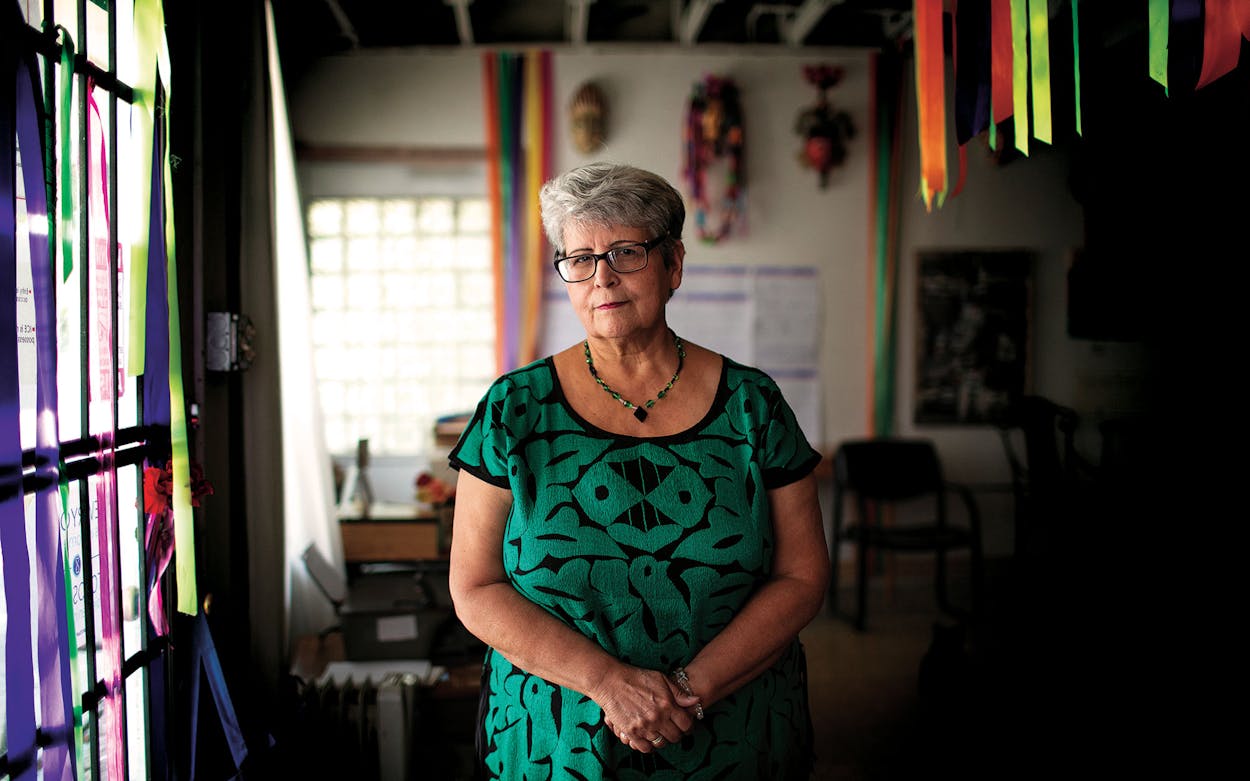A woman who goes into a house to clean can face the same risks as a woman suffering from domestic violence. She’s behind closed doors in someone else’s home, often without her own transportation. Sometimes she’s living on the property, sometimes without papers. The power dynamic means that she’s considered less than the person who hired her, and often the people in power feel that they can do anything they want. Domestic workers are like invisible people at times. People treat them like they’re part of the furniture, like they’re not even human beings.
A lot of the ladies at Domésticas Unidas have found themselves cleaning a house, and she is left alone with a man, even a young man, in the household; he brushes against the domestic worker, and finds himself undressed all of a sudden, needing something from the domestic worker. These men take advantage of the vulnerability of the woman who comes to clean their home for them.
For women that live under the same roof as their employers, there’s even more vulnerability. Besides the long hours, they get exposed to all kinds of situations in the middle of the night, because they find themselves not only alone during regular daylight hours, but also alone at night.
We’ve had to rescue workers. One lady was able to make a phone call and tell us that she was being kept against her will. Her employers had held her paperwork, and she wanted to get out, but she was afraid. She needed somebody to help her get out of the house. Araceli Herrera, who founded Domésticas Unidas, and another member of the group drove there at night. It was a huge house with a lot of property—only one road in, one road out. So they drove in, killed the lights, got the woman into the car as quietly as possible, and drove out as quickly as they could with the lights off. We got some attorneys to hear her story, but they didn’t believe her. After many interviews, this woman was afraid, and she gave up. She disappeared. We haven’t been able to find her.
When women try to report these incidents, often nothing happens. Again and again, the domestic worker is not believed, because the employer has power or has a title. These women get discouraged, because it’s not just the struggle of what they went through. Coming forward, risking their livelihood and supporting their families, is the bravest thing. And yet, everybody makes it so hard for them. Nobody believes them. Nobody takes action.
As women, we’ve all lived through this: We’ve all been looked at across the desk, or sat at a counter and had somebody rub behind us, or kept quiet through conversations that were totally uncalled for. I experienced that when I picked cotton, and when I hoed beets, and when I worked as a construction estimator. But we need to talk more about it, and we need to involve men in those conversations. Men need to see how real the harassment and assault are, so they can be just as passionate as we are about fighting this. We need them on our side. We can’t do it alone.
We also need to accept that these stories are true. Women who speak up, who risk their way of providing for their families, wouldn’t make themselves the focal point of attention for any other reason than this is real. You can see it in the women, in how they tremble when they speak. And in order to change the culture so that women are believed, we need to change the face of authority.
Women are missing from positions of power, and that’s often because they’ve had things thrown at them so that they don’t make it to the top. When women come to our meetings, I tell them: Do not give up your professional careers to take care of your children or the elderly members of your family. Hire a domestic worker instead. If you do that, you can help another woman support her family in a dignified way. Educated women, professional women—we need you up there, changing the world for the benefit of all of us down here. You can love your family and be there for them all you want, but hire a domestic worker. Don’t give up your career. Professional women, educated women—they can have the solutions we need, and I want to give them the chance. The women who don’t have that chance are suffering, and we will not see any remedies until we have women in positions of power. I believe that is fundamental: we need women in leadership, so that women hear our stories. It starts with having people that can relate up there in power, so that when women speak, their voices are heard.
To see resources about female mentorship, getting involved in local issues, and what to do if you experience sexual harassment, read here.
More from this collection
The Women’s Voices Project
In a series of as-told-to conversations, two dozen Texas women talk about gender, work, and what needs to change for women in their home state. Read their perspectives here.






